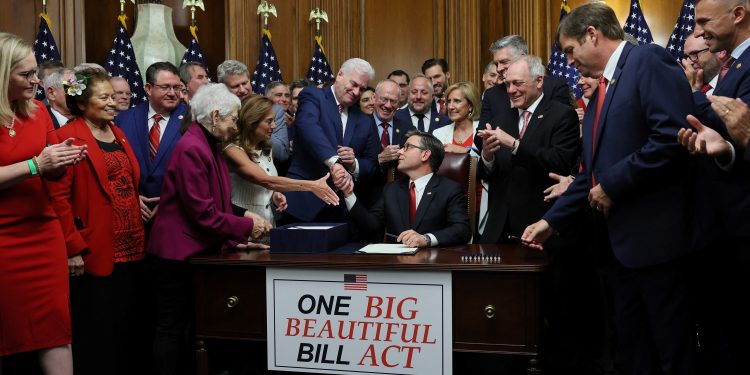It is a broad spending budget bill, with which Trump will apply a brutal ‘chainsaw’ by drastically cutting resources to important social benefits, such as Medicaid, Medicare, the Supplemental Nutrition Assistance Program (SNAP), known colloquially for food stamp, universities, as well as resources for environmental protection. All whilst substantially increasing resources for Homeland Security, i.e. for his anti-immigration policy. The big winners of this bill are ICE (U.S. Immigration and Customs Enforcement), the Pentagon and US millionaires.
All US media and analysts agree that the changes to the tax code in the bill will particularly benefit the very rich, to the detriment of the poorest.
It is no coincidence then that big business groups have supported Trump’s ‘big, beautiful bill‘, with the Chamber of Commerce (business association advocacy group and the largest lobbying group in the United States) and the US Business Roundtable (a nonprofit lobbyist association. Unlike the Chamber of Commerce, whose members are entire businesses, Roundtable members are exclusively CEOs) applauding the Senate’s passage of the bill on Tuesday. Corporations are betting that they will benefit from legislation that will make the tax breaks from the Tax Cuts and Jobs Act of 2017 permanent.
Medicaid and SNAP: Millions to go without health insurance and food
The bill cuts $1 trillion from the Medicaid health insurance programme that benefits millions of seniors, children and people with disabilities. These cuts will affect hospital funding, which could lead to massive staff layoffs. The new rules add stricter work and bureaucratic requirements for Medicaid and SNAP, which could leave thousands of beneficiaries without coverage.
“The real-life consequences of these nearly $1 trillion in Medicaid cuts – the largest ever proposed by Congress – will result in irreparable damage to our health care system, reducing access to care for all Americans and severely undermining the ability of hospitals and health systems to care for our most vulnerable patients” said Rick Pollack, chief executive officer of the American Hospital Association.
The Congressional Budget Office estimated that nearly 12 million people could lose their health insurance by 2034 because of these measures. In the case of Medicaid, beneficiaries will have to undergo income and address reviews every six months, which would mean that people who do not have a stable address could easily lose their coverage because they do not receive official notifications. On the other hand, few of those excluded from Medicaid coverage would have access to employment-based health insurance.
In total, the bill could result in another 10 million people being uninsured by 2034, in addition to the millions who are uninsured today, according to a CNN analysis.
The law limits and eliminates some undergraduate student loan programmes and increases eligibility requirements for others.
Grad PLUS loans for graduate school are eliminated, which could mean fewer students attending graduate school. It also reduces Parent PLUS loans to 65,000$ per year per student, which could hurt black and Latino families in particular, who often use these loans to put one of their children through college, which is extremely expensive in the United States. Also, higher interest rates make it more difficult to repay loans, which could exacerbate student debt.
Trump has promised to revive the American manufacturing industry, but clean energy analysts expect it to actually have the opposite effect. The American Clean Power Association criticized the legislation as a “step backwards in American energy policy”, that will eliminate jobs and increase electricity bills. “Workers will be affected by plant closures and construction disruption” says a report published this week by the think tank Energy Innovation. The analysis predicts that job losses will continue for several years, reaching a maximum of 900,000 in 2032, of which more than 230,000 would be manufacturing jobs.
The bill eliminates tax incentives for wind, solar and other renewable energy projects by 2027 and imposes much stricter requirements on developers to be able to claim them. It also opens up federal lands and waters for oil and gas exploration and increases their profitability, while creating new federal support for coal. An analysis from Princeton University showed that the bill is expected to contribute an additional 470 million metric tons of greenhouse gas emissions per year by 2035, the annual equivalent of more than 100 million gas-powered cars on the road.
Spending to carry out Trump’s anti-immigration policy will increase by 170$ billion over the next four years, in stark contrast to the cuts to health, education and the environment.
In this regard, the conservative CATO research institute, which is linked to Republican sectors, predicts that once this law comes into force, the number of people locked up in detention centres for migrants will quadruple: from 50,000 at present to more than 200,000 across the country.
Although the sweeping budget bill and its harsh cuts have been passed, all is not yet said and done. The workers and the American people will mobilise against the perverse effects of this law. Already the giant has woken up, and proven so with massive mobilisations in April, with the ‘Hands Off’ protest, and in the ‘No Kings’ day in June, where some 6 million Americans mobilised in more than 2000 cities and towns across the entire USA.
We have to continue and strengthen the mobilisation until we defeat the austerity plans and Donald Trump’s ‘Chainsaw‘.
https://www.insidehighered.
https://www.elindependiente.
https://www.lanacion.com.ar/
https://www.nytimes.com/es/
https://insideclimatenews.org/













